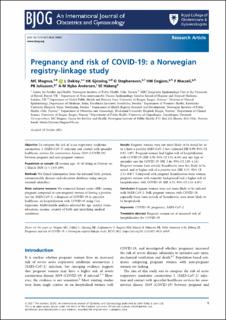| dc.contributor.author | Magnus, Maria Christine | |
| dc.contributor.author | Oakley, Laura L. | |
| dc.contributor.author | Gjessing, Håkon K. | |
| dc.contributor.author | Stephansson, Olof | |
| dc.contributor.author | Engjom, Hilde Marie | |
| dc.contributor.author | Macsali, Ferenc | |
| dc.contributor.author | Juliusson, Pétur Benedikt | |
| dc.contributor.author | Nybo Andersen, Anne-Marie | |
| dc.contributor.author | Håberg, Siri Eldevik | |
| dc.date.accessioned | 2021-12-08T10:38:39Z | |
| dc.date.available | 2021-12-08T10:38:39Z | |
| dc.date.created | 2021-11-17T12:30:51Z | |
| dc.date.issued | 2021 | |
| dc.identifier.issn | 1470-0328 | |
| dc.identifier.uri | https://hdl.handle.net/11250/2833326 | |
| dc.description.abstract | Objective: To compare the risk of acute respiratory syndrome coronavirus 2 (SARS-CoV-2) infection and contact with specialist healthcare services for coronavirus disease 2019 (COVID-19) between pregnant and non-pregnant women.
Population or sample: All women ages 15–45 living in Norway on 1 March 2020 (n = 1 033 699).
Methods: We linked information from the national birth, patient, communicable diseases and education databases using unique national identifiers.
Main outcome measure: We estimated hazard ratios (HR) among pregnant compared to non-pregnant women of having a positive test for SARS-CoV-2, a diagnosis of COVID-19 in specialist healthcare, or hospitalisation with COVID-19 using Cox regression. Multivariable analyses adjusted for age, marital status, education, income, country of birth and underlying medical conditions.
Results: Pregnant women were not more likely to be tested for or to a have a positive SARS-CoV-2 test (adjusted HR 0.99; 95% CI 0.92–1.07). Pregnant women had higher risk of hospitalisation with COVID-19 (HR 4.70, 95% CI 3.51–6.30) and any type of specialist care for COVID-19 (HR 3.46, 95% CI 2.89–4.14). Pregnant women born outside Scandinavia were less likely to be tested, and at higher risk of a positive test (HR 2.37, 95% CI 2.51–8.87). Compared with pregnant Scandinavian-born women, pregnant women with minority background had a higher risk of hospitalisation with COVID-19 (HR 4.72, 95% CI 2.51–8.87).
Conclusion: Pregnant women were not more likely to be infected with SARS-CoV-2. Still, pregnant women with COVID-19, especially those born outside of Scandinavia, were more likely to be hospitalised. | en_US |
| dc.language.iso | eng | en_US |
| dc.publisher | Wiley | en_US |
| dc.rights | Navngivelse 4.0 Internasjonal | * |
| dc.rights.uri | http://creativecommons.org/licenses/by/4.0/deed.no | * |
| dc.title | Pregnancy and risk of COVID-19: a Norwegian registry-linkage study | en_US |
| dc.type | Journal article | en_US |
| dc.type | Peer reviewed | en_US |
| dc.description.version | publishedVersion | en_US |
| dc.rights.holder | Copyright 2021 the authors | en_US |
| cristin.ispublished | true | |
| cristin.fulltext | original | |
| cristin.qualitycode | 2 | |
| dc.identifier.doi | 10.1111/1471-0528.16969 | |
| dc.identifier.cristin | 1955516 | |
| dc.source.journal | BJOG: An International Journal of Obstetrics and Gynaecology | en_US |
| dc.relation.project | EC/H2020/947684 | en_US |
| dc.relation.project | Norges forskningsråd: 262700 | en_US |
| dc.relation.project | Nordforsk: 105545 | en_US |
| dc.identifier.citation | BJOG: An International Journal of Obstetrics and Gynaecology. 2021. | en_US |

